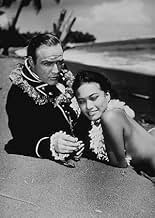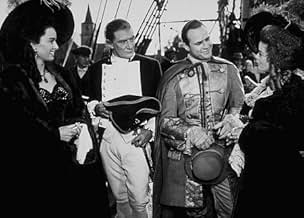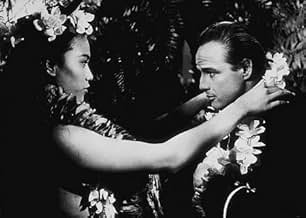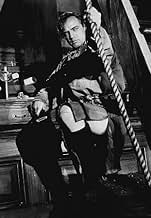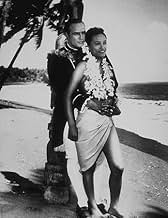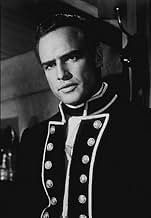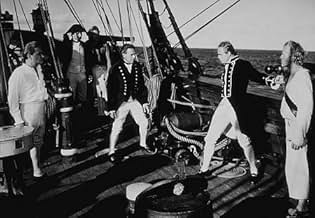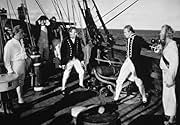En 1787, le navire britannique Bounty quitte Portsmouth pour apporter une cargaison de fruits à pain de Tahiti, mais les conditions de bord brutales déclenchent une mutinerie menée par l'off... Tout lireEn 1787, le navire britannique Bounty quitte Portsmouth pour apporter une cargaison de fruits à pain de Tahiti, mais les conditions de bord brutales déclenchent une mutinerie menée par l'officier Fletcher Christian.En 1787, le navire britannique Bounty quitte Portsmouth pour apporter une cargaison de fruits à pain de Tahiti, mais les conditions de bord brutales déclenchent une mutinerie menée par l'officier Fletcher Christian.
- Réalisation
- Scénario
- Casting principal
- Nommé pour 7 Oscars
- 3 victoires et 13 nominations au total
Avis à la une
I liked this 'Mutiny On The Bounty' better than the critics did, who got annoyed at Marlon Brando's British accent. I found nothing wrong with it and I usually am critical about that sort of thing myself. Brando gave a solid performance.
Trevor Howard was convincing as the sadistic "Captain Bligh" and Tarita was fair as the love interest "Maimiti." The cinematography might have been the best feature of the film, a definite movie for widescreen as a lot of these mid '50s-to-mid '60s films were. There are some beautiful shots in here, beginning with those Tahiti sunsets. The color in this movie is magnificent.
Although not particularly a film you might watch over and over, I found no major fault with it except for perhaps the romance which was a bit sappy. The adventure, acting and photography were all top-notch and the three hours went by fairly fast.
Howard's Bligh is brilliant, and not at all like the prancing cartoonish Charles Laughton version in '35. And when it comes to Christian, the protaganist of the mutiny, Brando makes an admirable effort to capture the essence of the the fopish and aristocratic character as portrayed in the Nordhoff and Hall book upon which both MGM "Bountys" are based. Brando becomes Christian, in the 1935 movie Clark Gable as Christian is just Gable as Gable, and that's that. Richard Harris as crew member Mills, is another solid portrayal in the 1962 movie.
Don't get me wrong, the 1935 movie's fun, but the 1962 movie is infinitely more impressive in all respects, especially its use of a real ship made just for the film, the awesome "shots" of life at see in the late 1700s, and of course the spectacular location filming in Tahiti.
1935's Mutiny on the Bounty, was a fine film in its day, but it doesn't stand the test of time, 1962's film stands that test. Is it a great movie, probably not, but it is a very good one. Considering that MGM did not deliver the ship on time for filming before the bad weather set in in Tahiti, MGM's firing of legendary director Carol Reed, and other miscalculations mainly attributable to producer Aaron Rosenberg, the film is a remarkable achievement.
The studio used an off-form Lewis Milestone as a replacement for director Reed. Once they decided that Reed wasn't their cup of tea, they just tried to slide by with Milestone, instead of securing the services of one of the many still vital directing greats working in the early 1960s. A movie of epic proportions like 1962's Mutiny on the Bounty, cried out for a William Wyler, a David Lean, or a Fred Zinneman, to take over the helm once Reed was canned.
When the movie didn't hit like gangbusters, MGM's publicity machine moved quickly to "sandbag" their star, and the lemmings of the early 60s entertainment press corps swallowed the studio's propaganda whole. It was open-season on Brando, and it was shameful, but anybody who has seen the movie and also read the book, knows that Brando's Christian is a very solid performance. I'm sure Brando was peevish and nettlesome at times during production, Trevor Howard says as much in his biography, but to blame Brando for the film's bloated final cost and its lack of epic earnings is ludicrous.
I love 1962's Mutiny on the Bounty, it should have been better, but its still one beautiful movie. It is an under-appreciated and highly underrated movie. I strongly recommend it, to me calling Brando and Howard's Mutiny on the Bounty of 1962, a minor film, as one IMDb movie fan recently did, is blasphemous. The truth is MGM, just fumbled the ball on Mutiny on the Bounty in 1962, despite all of their ineptitude during production, they still had what should have been a major hit. But they opened it as a road-show movie in just a few theatres nation wide instead of in as many theatres as possible like the studios do with all major movies today. Despite MGM's poor efforts 41-years ago, movie fans today can scoop up the old lion's fumble and enjoy this exciting high seas adventure/love story.
It took a better book, Richard Hough's "Mr. Bligh and Mr. Christian," to produce a better movie rendition of the true life Mutiny on the Bounty. That book was the basis for the magnificent, "The Bounty," starring Anthony Hopkins as Bligh, and Mel Gibson as Christian. Also adding lustre to that movie were Liam Neeson, and Daniel Day-Lewis.
Furthermore, there are two fascinating performances by Marlon Brando and Trevor Howard. Howard is not quite as showy in the role as the scenery-chewing Laughton but his characterization is a bit more complex. Brando does an excellent job as Christian, posturing in the manner of a gentleman and speaking with an upper crust British accent that is entirely credible. Indeed, when he reaches the mutinous moment in a rage of uncontrolled anger, he is at the top of his acting form. Even so, some of his most effective moments are quietly underplayed. His performance deserved an Oscar nomination--but with so much bad publicity surrounding the film and the hardships and strains involved in the making, Hollywood apparently gave him the cold shoulder. Years later, they did the same to Russell Crowe for his bad boy behavior.
Technically, of course, the film is far superior to the B&W 1935 Gable-Laughton film. Gorgeous sunsets are backdrops to the ship at sea and the island scenes in Tahiti are gorgeous to behold.
A missing element from the earlier film is the absence of the character played by Franchot Tone. Indeed, Tone was nominated for a Best Actor award, along with Gable. There are numerous other differences but this take on the story is a good one, every bit as valid as the 1935 film.
With all of the bad publicity surrounding the film relegated to the past, we can look at this film with a fresh viewpoint today and enjoy it for the entertaining blockbuster that it is. Highly recommended.
It's fair to say you are a Captain disciplined, and you like to see subordinates lose skin, the cat o' nine tails is a smash, as they're beaten, whipped and slashed, filling your sails with such an overwhelming wind. If all else fails you go the distance and keelhaul, dragging the guilty of just what on a long trawl, prevents the crew from going soft, like rotten food they have to scoff, although you never hear the sounds, of their death squall. Although this time it seems you've pushed the boat too far, Fletcher Christian takes his chance to fight and spar, your ejected and cast-off, mutinous rabble will pay the cost, as you're left to drift for weeks, under the stars.
Brando's accent - what's that all about.
All of these elements help to elevate the core story in Mutiny on the Bounty: Bligh and Christian. As Bligh, Trevor Howard changes the character immortalized by Charles Laughten in the 1935 version. Instead of inhuman, demonic tyrant, Howard portrays Bligh simply as an excruciatingly stern captain focused(a little overzealously) on doing the best job that he can. If his mean do not pursue his goals with the same fervor. He gets impatient then frustrated then angry and then violent all in quick succession. He makes for a very realistically workaholic without a life, and he wants everyone else to be a workaholic, too. I thought Clark Gable's Fletcher Christian could not be topped...until I saw Marlon Brando undergo a sheer transformation playing the role. After seeing Brando in ON THE WATERFRONT and the equally American THE GODFATHER, I could not imagine him playing 18th Century British officer...but he did. Brando perfects the haughty, posturing walk. He perfects the clipped, accented speech. He perfects the foppish, effeminate walk of a "true" English gentlemen of high-born connections. Brando does it so remarkably well that one cannot imagine such sissified character leading a mutiny against a tyrannical man like Bligh. Brando's transformation of Christian from sissy to mutiny leader baffles. Unlike Gable, he doesn't gloss over the decision to be a mutineer. Gable made it look easy and as the "right thing to do". Realistically, is it the right thing to do? To throw away your career that you worked hard for? To throw away your life? All for the sake of a feeling a moral belief? It may sound hard, but when faced with a such a delimma, it can be agonizing...which is exactly what Brando captures to a tee, right down to the last frame.
Mutiny on the Boutny 1962 truly needs to be seen. Please don't listen to critics. This movie is fantastic.
Le saviez-vous
- AnecdotesThe ship built for the film sank in the Atlantic Ocean after taking on water on October 29, 2012 during Hurricane Sandy off of the East Coast of the United States. It was last seen with only the masts standing above the water. Two of the crew died: the Captain, Robin Walbridge, and Claudene Christian, the direct descendant of Fletcher Christian.
- GaffesThe actual mutiny did not happen in the manner portrayed in the film. Christian and the other mutineers actually took the ship in the early hours of the morning, while Bligh and almost everyone else was asleep.
- Citations
Fletcher Christian: [to Captain Bligh] You remarkable pig. You can thank whatever pig god you pray to that you haven't turned me into a murderer.
- Versions alternativesThe original 1962 print had a different opening scene, in which a ship's crew lands on Pitcairn and discovers an artifact belonging to the H.M.S. Bounty. They can barely read the name until William Brown (Richard Haydn), now aged, appears on the beach and says "Bounty". He then proceeds to tell the story of the famous mutiny, of which he is apparently the last surviving member. That is why we hear his voice narrating the story. In all current prints, including the one shown on Turner Classic Movies ca. 2005, this opening scene is omitted, so we do not know why Brown is telling the story in voiceover. However, the scene has been restored on the 2006 DVD release.
- ConnexionsFeatured in Hollywood: The Fabulous Era (1962)
Meilleurs choix
Détails
- Date de sortie
- Pays d’origine
- Langues
- Aussi connu sous le nom de
- Motín a bordo
- Lieux de tournage
- Bora Bora, Leeward Islands, Polynésie Française(first breadfruit collecting party)
- Société de production
- Voir plus de crédits d'entreprise sur IMDbPro
Box-office
- Budget
- 19 000 000 $US (estimé)
- Durée2 heures 58 minutes
- Rapport de forme
- 2.76 : 1
Contribuer à cette page



